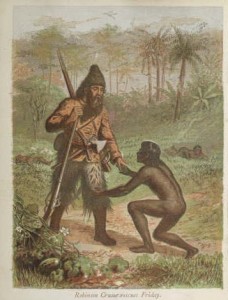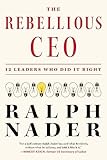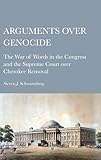Daniel Defoe’s Robinson Crusoe is one the most famous books in history as its popularity continues after three hundred years of readership. The titular figure’s perseverance and ingenuity fascinates us as he surmounts one seemingly impossible predicament after another. Yet do Crusoe’s triumphs merit our accolades? Exactly how admirable is Robinson Crusoe? Irrefutably, one of the qualities which make Defoe’s novel such an intriguing narrative is that it frequently presents its central character with paradoxical moral dilemmas. Consequently, we witness Crusoe judiciously deliberating upon a state of affairs only to defer to standards, ideas, and logic that are both relatively and normatively dubious.
Robinson Crusoe’s ethics are rooted in his inherent imperialism. Being the only representative of his race and culture for 27 of his 28 years upon the island, and considering both superior to all others, he not only endeavors—regardless if it is applicable, necessary, or even viable—to replicate the society from which he came but, through these means, to reign supreme over his environment. Crusoe is culpable because he acknowledges that he has been freed from socially-defined standards and, more importantly, that such standards might, in themselves, be questionable yet, after rationalizing the ethically justifiable course of action, he frequently opts for a more self-aggrandizing, convenient, or profitable avenue.
 For example, he criticizes the Spanish Inquisition as being unjust yet forces a Caribbean native whom he has liberated from being cannibalized—not on moral grounds but in order to obtain a servant—to assimilate to his Anglo-Saxon lifestyle. Crusoe never bothers to ask the native’s given name. Instead, to commemorate the day upon which Crusoe acted so gallantly, “the creature” is nonchalantly dubbed “Friday.” Crusoe then demands that the native be clothed despite Friday being uncomfortable in such adornments and, moreover, the climate not requiring such. Furthermore, Crusoe rarely inquires into Friday’s perspectives, customs, or culture (the latter has to offer them), thus implying that Crusoe believes his ways to be implicitly superior as he proceeds to teach Friday to speak English and convert him to Christianity. It is worthy of note that, when Friday is rescued, he grovels at his liberator’s feet. Crusoe does not lift Friday up but permits him to remain in his subservient position so as to establish the desired hierarchy (he has Friday refer to him as “Master”) as well as to satiate his narcissism. Astoundingly, Crusoe allows this to occur not once but twice. (Similarly, prior to Crusoe’s discovery of humans upon the island, he revels in his “sovereignty” over the island’s fauna, as he observes that he has capricious control over whether it lives or dies.) The epitome of Crusoe’s moral myopia toward Friday resides in Crusoe’s lack of empathy after having once been enslaved himself. Most pointedly, being free of societal customs and beliefs, there is no alibi for why he continues to uphold the institution of slavery, especially considering that, for several years, Crusoe and Friday are the island’s only inhabitants. Granted, he does not literally bind Friday in shackles and chains, however, he treats him as an inferior and in a manner which, if back in Europe, he would by no means apply to a fellow Briton.
For example, he criticizes the Spanish Inquisition as being unjust yet forces a Caribbean native whom he has liberated from being cannibalized—not on moral grounds but in order to obtain a servant—to assimilate to his Anglo-Saxon lifestyle. Crusoe never bothers to ask the native’s given name. Instead, to commemorate the day upon which Crusoe acted so gallantly, “the creature” is nonchalantly dubbed “Friday.” Crusoe then demands that the native be clothed despite Friday being uncomfortable in such adornments and, moreover, the climate not requiring such. Furthermore, Crusoe rarely inquires into Friday’s perspectives, customs, or culture (the latter has to offer them), thus implying that Crusoe believes his ways to be implicitly superior as he proceeds to teach Friday to speak English and convert him to Christianity. It is worthy of note that, when Friday is rescued, he grovels at his liberator’s feet. Crusoe does not lift Friday up but permits him to remain in his subservient position so as to establish the desired hierarchy (he has Friday refer to him as “Master”) as well as to satiate his narcissism. Astoundingly, Crusoe allows this to occur not once but twice. (Similarly, prior to Crusoe’s discovery of humans upon the island, he revels in his “sovereignty” over the island’s fauna, as he observes that he has capricious control over whether it lives or dies.) The epitome of Crusoe’s moral myopia toward Friday resides in Crusoe’s lack of empathy after having once been enslaved himself. Most pointedly, being free of societal customs and beliefs, there is no alibi for why he continues to uphold the institution of slavery, especially considering that, for several years, Crusoe and Friday are the island’s only inhabitants. Granted, he does not literally bind Friday in shackles and chains, however, he treats him as an inferior and in a manner which, if back in Europe, he would by no means apply to a fellow Briton.
It is with such happenstance convenience that Crusoe reinforces his religious views before summarily dismissing them. For instance, after several languid gestures toward reverence, once Crusoe is born-again, he maintains a calendar and observes the Sabbath. Yet, when he loses track of the date, his devotion subsequently subsides. Additionally, when he notices that barley has sprouted near his “castle” (shelter), being unable to reconcile how it arrived there, he attributes its presence to God’s will. He then recalls that he’d discarded several husks which might have contained seeds and dismisses divine intervention as being the culprit. Obviously, Crusoe’s level of devotion is dependent upon need (such as illness or desperation) or occurrences which he cannot readily rationalize and his theological fervor abruptly diminishes once he no longer requires assistance or deduces a non-supernatural cause for previously inexplicable events. Not surprisingly, he considers abandoning his faith in favor of another once he is rescued because doing so would be more lucrative (Catholicism is the reigning religion in Brazil, which is where his tobacco plantation resides).
Even in the wake of society, Crusoe is unable to sever himself from his entrepreneurial tendencies and, however futile, desire for material and monetary possessions. Despite his conjectures that, like Jonah, he might have been cast out for his sins (Crusoe would have never found himself stranded had he not set out to sea to procure more slaves), he produces more food than he can consume only to watch it rot. He practices animal husbandry and agriculture after conceding that the island aptly provides for his needs without having to resort to such labor-intensive activities. He even goes so far as to craft a table and chair. As noted, he has a “castle,” but he also possesses another shelter-cum-estate as well, which he refers to as his “bower.” Even after admitting that money has no intrinsic value in a tender-free existence, Crusoe hordes every coin he finds. Lastly, toward the end of his “reign” upon the island, the self-described “king” begins cataloguing people as possessions: He refers to the island’s inhabitants as his “subjects,” prisoners as “my people,” and even perceives specific (and in his mind, civilized) individuals as being his own, i.e. “the Spaniard” quickly metamorphoses into “my Spaniard.”
Other instances of Crusoe’s moral hypocrisy and logistic incongruity include his consenting that cannibals might well be acting upon political or cultural principles and, as a result, it may not his place to pass judgment upon them. (Friday confirms this when he informs Crusoe that cannibalism is the consequence of warfare and is not a standard practice, as evidenced by 17 stranded Britons currently residing peacefully amongst Friday’s people.) Nevertheless, and despite his newfound religiosity, Crusoe—against his better judgment and moral conscious—proceeds to slaughter cannibals in the name of God. He never reconciles the paradox in his condemnation of the cannibals’ capital punishment and his own country’s like sentence for mutiny.
Not surprisingly, Crusoe hasn’t any friends. Rather, his associations are strictly limited to accomplices, acquaintances, or business partners. (After he is rescued, he does go on to marry but never cites his wife by name.) Every individual’s worth is based upon the person’s utilitarian value as Crusoe refuses to permit sentimentality to intervene in his decision-making. This is best evidenced in his selling of Xury, a Moorish youth who aided Crusoe in escaping enslavement, which Crusoe later regrets—not because he misses the boy (though he does)—but because he is in need of additional labor on his Brazilian plantation. Dauntingly, when he is rescued, Crusoe leaves the island to British criminals without attempting to notify those who have set off to sea in search for help—the aforementioned Spaniard and Friday’s father—that there are new, dangerous inhabitants awaiting them upon their return. These individuals are not even an afterthought in that, in lieu of the maritime risks involved atop the political tension between Spain and Britain, Crusoe never bothers to inform us of the rescue mission’s fate, even after returning to the island years later. This omission is all the more insulting given that the seafarers aided Crusoe in retaining control of the island after mutineers came ashore.
What perhaps best outlines the Crusoe’s Machiavellian nature is his reaction to a single footprint which mysteriously appears on the beach one day. Though, upon his initial appearance upon the island, he longed to be rescued, Crusoe gradually becomes apprehensive of any sign of human life, as seen in him automatically assuming the enigmatic mark to be the sign of a hostile presence. Crusoe’s paranoia stems from fear that his comfortable state of existence and omnipotence might be compromised whereas before, when he was unsure of his ability to survive, he longed for salvation. He fears, not only cannibalistic natives, but also Spaniards. Yet ironically, fellow Britons prove to be his greatest threat (thereby negating Crusoe’s ethnocentricity). His megalomania is exemplified by his inability and unwillingness to admit fault even after he has returned to Europe. Various dates in his calendar are blaringly incorrect and, though a simple pen stroke would eradicate the errors and the reader would be none the wiser (while saying nothing of the intellectual integrity that most authors would insist upon in acknowledging the mistakes so as to better represent the conditions under which they were operating), Crusoe chooses to ignore them.
Though he does possess a few redeeming qualities, such as resourcefulness and determination, Daniel Defoe’s character of Robinson Crusoe is by no means a hero or even an admirable human being. He is an unapologetic racist, imperialist, fickle theist, and megalomaniac par excellence. He continually shirks moral obligation in favor of activities wherein he will profit, be it financially or socially, or which will appease his narcissism. His lethargy is only superseded by potential harm or ennui. He displays little moral development in that he rewards those who were faithful to his financial interests while he was stranded—not out of respect or gratitude—but anxiety and vanity respectively: Fearing that the Inquisition may result in martyrdom, he sells his plantation and donates the proceeds, of which “The world will seldom be able to show the like of.” During his valediction, Crusoe declares that he has since cast off once again, thereby implying that—to our knowledge—he might have committed many of the same moral atrocities on his “new adventure.” And why not? What evidence do we have to the contrary that, after 28 years on a desert island, he is any the wiser since this ten-year voyage opens with his return to the island where (in true capitalistic spirit) he divides “his colony[’s]” land into plots before announcing to its populace that it is not permitted to leave?










